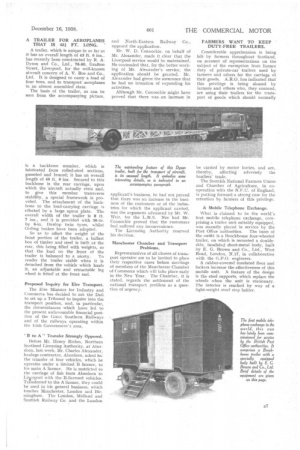A TRAILER FOR AEROPLANES THAT IS 431 FT. LONG.
Page 41

If you've noticed an error in this article please click here to report it so we can fix it.
A trailer, which is unique in so far as it has an overall length of 43 ft. 6 ins., has recently been constructed by R. A. Dyson and Co., Ltd., 76-80, Grafton Street, Liverpool, for the well-known aircraft concern of A. V. Roe and Co., Ltd. It is designed to carry a load of four tons, and to transport aeroplanes in an almost assembled state.
The basis of the trailer, as can be seen from the accompanying picture, is a backbone member, which is fabricated from rolled-steel sections, gusseted and braced; it has an overall length of 40 ft. 9 ins. Secured to this backbone is the rear carriage, upon which the aircraft actually rests and, to give this member transverse stability, a special framework is provided. The attachment of the backbone to the load-carrying carriage is effected by a large apron plate. The overall width of the trailer is 0 ft. 7 ins., and it is provided with 36-in. by 8-in. Dunlop twin tyres, whilst Girling brakes have been adopted.
So as to offset the weight of the front portion of the trailer, a ballast box of timber and steel is built at the rear, this being filled with weights, so that the load on the front of the trailer is balanced to a nicety. To render the trailer stable when it is detached from the vehicle which hauls it, an adjustable and retractable leg wheel is fitted at the front end.
Proposed Inquiry for Eire Transport.
The Eire Minister for Industry and Commerce has decided to ask the Dail to set up a Tribunal to inquire into the transport position,. and, in particular,. the circumstances which have led to the present unfavourable financial position of the Great Southern Railways and of the railways operating within the Irish Government's area.
' B to A" Transfer Strongly Opposed.
Before Mr. Henry Riches, Northern Scotland Licensing Authority, at Aberdeen, last week, Mr. Charles Alexander, haulage contractor, Aberdeen, asked fo.c the transfer of four vehicles, which he operates under a limited B licence, to his main A licence. He is restricted to the carriage of fish from Aberdeen to Liierpool with the B-licensed vehicles. Transferred to the A licence, they could be used in his general business, which touches Manchester, London and Birmingham. The London, Midland and Scottish Railway Co. and the London and North-Eastern Railway Co., opposed the application. • Mr. W. D. Connochie, on behalf of Mr. Alexander, made it clear that the Liverpool service would be maintained. He contended that, for the better working of Mr. Alexander's service, the application should be granted. Mr. Alexander had given the assurance that he had no intention of expanding his activities, Although Mr. Connochie might have proved that there was an increase in applicant's business, he had not proved that there was an increase in the business of the customers or of the industries for which the applicant carried, was the argument advanced by Mr. W. Weir, for the L.M.S. Nor had Mr. Connochie proved that the customers had suffered any inconvenience.
The Licensing Authority reserved his decision.
Manchester Chamber and Transport Problems.
Representatives of all classes of transport operator are to be invited to place their respective cases before meetings of members of the Manchester Chamber of Commerce which will take place early in the New Year. The Chamber, it is stated, regards the settlement of the national transport problem as a question of urgency. FARMERS WANT TO KEEP DUTY-FREE TRAILERS.
Considerable apprehension is being felt by farmers throughout Scotland, on account of representations on the subject of the exemption from licence , duty of private-car trailers used by farmers and others for the carriage of their goods. A.R.O. has indicated that this privilege is benig abused by farmers and others who, they contend, are using their trailers for the transport of goods which should normally be carried by motor lorries, and are, thereby, affecting adversely the hauliers' trade.
The Scottish National Farmers Union. and Chamber of Agriculture, in cooperation with the N.F.U. of England, is putting forward a strong case for the retention by fainiers of this privilege.
A Mobile Telephone Exchange.
What ia claimed to be. the world's first mobile telephone exchange, comprising a trailer unit suitably equipped, was recently placed in service by the Post Office authorities. The basis of the outfit is a Brockhouse four-wheeled trailer, on which is mounted a doubleskin, insulated sheet-metal body, built, by E. G. Brown and Co., Ltd., West Road, London, N.17, in collaboration with the G.P.O. engineers.
A rubber-covered insulated floor and lockers increase the .effectiveness of this mobile unit. A feature of the design is the steel supports, which replace the wheels' when the unit is stationary. The interior is reached lay way of a light-weight steel step ladder.




























































































